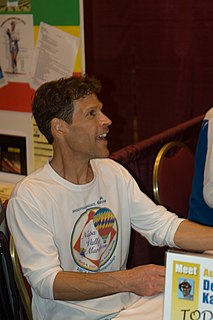A Quote by Noam Chomsky
So, at one extreme you have indigenous, tribal societies trying to stem the race to disaster. At the other extreme, the richest, most powerful societies in world history, like the United States and Canada, are racing full-speed ahead to destroy the environment as quickly as possible.
Related Quotes
The rich and powerful countries are trying to wreck as much as possible. You know, go off the cliff as soon as you can. Extract every drop of hydrocarbons off the ground and destroy the environment. At the opposite extreme are countries like Bolivia and Ecuador, indigenous people around the world, and first nations in Canada and tribal people in India, campesinos in Colombia... They're trying to save the commons.
You have to be an extremist to believe that you're gonna be the president of the United States and your name is Barack Hussein Obama! And he's using extreme methods, but his application is very smooth. Michelle Obama is extreme, her presence is extreme. And it's an extreme good. Extreme is not negative.
We must adjust our value systems and work to modify today's societies, in which economic interests are carried to the extreme and irrationally produce not merely objects, but weapons of war. These societies don't care about the destruction of the planet and mankind as long as they earn profits - it can't go on like this.
In England, enclosure programs kind of destroyed the commons. In the United States, it happened later. But, ah, now it's happening in the world. The last remnant of the commons is the environment, which the indigenous people are still trying to preserve and we sophisticated rich people are trying to destroy.
Facebook has become the richest and most powerful publisher in history by replacing editors with algorithms - shattering the public square into millions of personalised news feeds, shifting entire societies away from the open terrain of genuine debate and argument while they make billions from our valued attention.
We see that there are two different kinds of...societies: (a) parasitic societies and (b) producing societies. The former are those which live from hunting, fishing, or merely gleaning. By their economic activities they do not increase, but rather decrease, the amount of wealth in the world. The second kind of societies, producing societies, live by agricultural and pastoral activities. By these activities they seek to increase the amount of wealth in the world.
I have called this phenomenon of stealing common knowledge and indigenous science "biopiracy" and "intellectual piracy." According to patent systems we shouldn't be able to patent what exists as "prior art." But the United States patent system is somewhat perverted. First of all, it does not treat the prior art of other societies as "prior art." Therefore anyone from the United States can travel to another country, find out about the use of a medicinal plant, or find a seed that farmers use, come back here, claim it as an invention or an innovation.



































